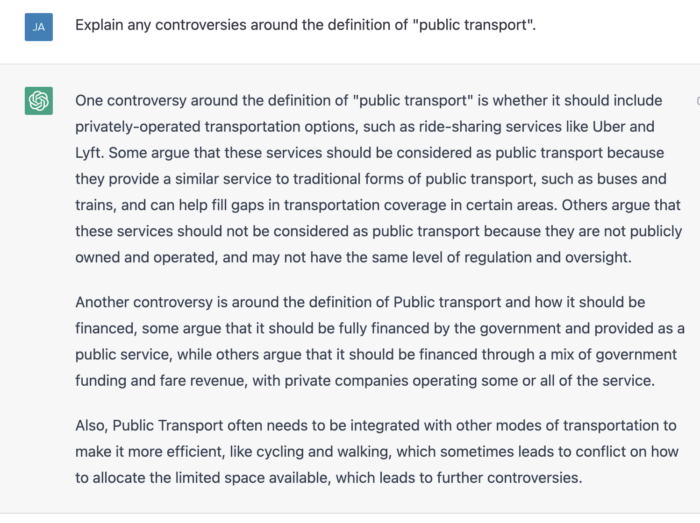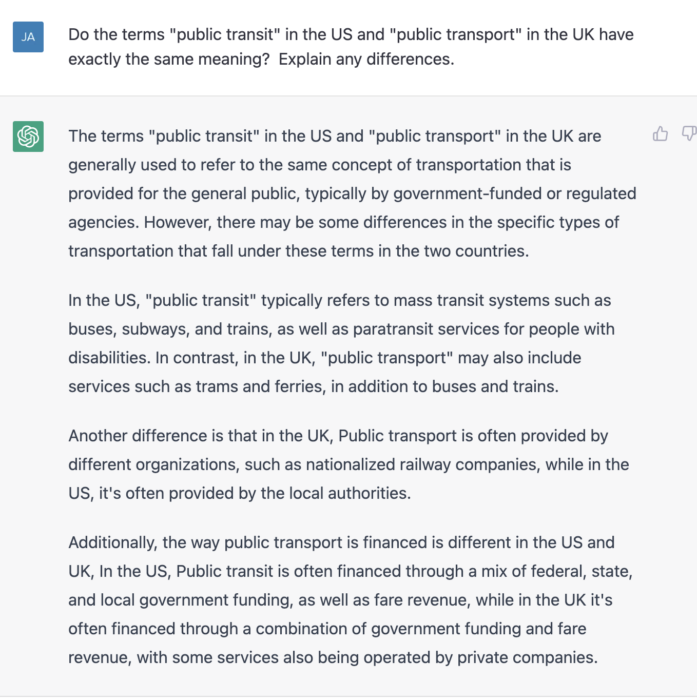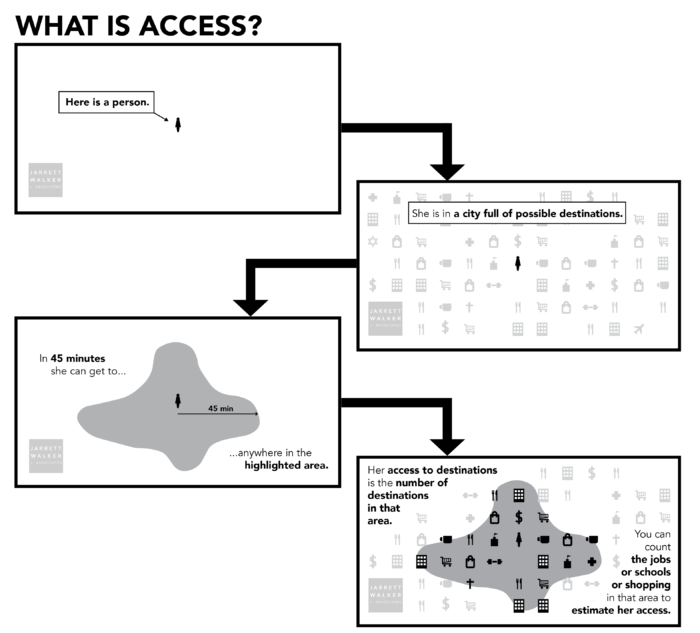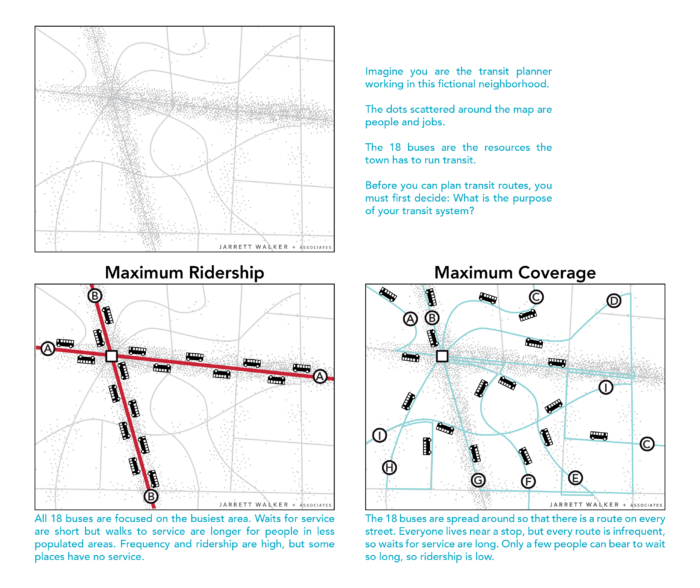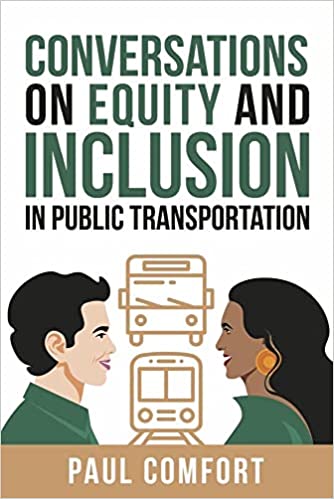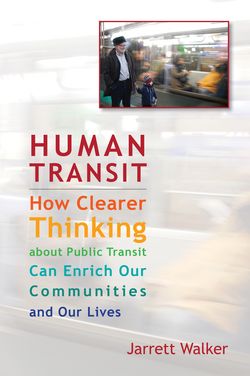A while back I wrote about Ada Palmer’s glorious science fiction series Terra Ignota, which I really do recommend to anyone with the slightest interest in philosophy, politics, or history. But I called out one feature of her world that made me crazy: the fantasy that globe-spanning supersonic driverless flying Uber would enable people to make daily trips of thousands of miles. These would abolish the constraints of geography (we’ve been promised this before) to the point that geographically bounded nations no longer made sense to anyone, and a fascinating new polity would be born. This technology, as Palmer imagined it, was so flexible that you could take such a car from Chile to Paris and land right next to the preferred door of your destination, without tearing down half of Paris to create all this landing space.
This is less surprising if you attend a tech conference and realize how completely the tech elite has bought the idea that fixed route transit, like big buses and trains, is soon to be obsolete. For many otherwise smart people it’s just a given that we’ll eventually all be in driverless cars that make different stops based on who’s traveling, and that in their highest form would always go nonstop, even though all those cars would never fit in anything we’d recognize as a city. People have even gotten into The Atlantic proposing to drastically reduce the capacity of the New York City Subway by remodeling it along these lines.
 Well, now I’m in the midst of Malka Older’s intriguing Infomocracy trilogy, and am sensing a trend. This future Earth has the same flying cars (she calls them “crows”) although it’s clear here, as it is not in Palmer, that they are expensive to use. For those who can’t afford them, though, there’s something like demand-responsive transit or “microtransit“. In an early scene, we watch a man crossing Japan and notice the ruins of the Shinkansen, as though the new airborne services have abolished one of the most space-efficient (and therefore liberating) passenger services in one of the densest places the world. When I try to make sense of this I can only assume that in this hyperconnected and hyperinformed world, there’s just not so much need for travel anymore.
Well, now I’m in the midst of Malka Older’s intriguing Infomocracy trilogy, and am sensing a trend. This future Earth has the same flying cars (she calls them “crows”) although it’s clear here, as it is not in Palmer, that they are expensive to use. For those who can’t afford them, though, there’s something like demand-responsive transit or “microtransit“. In an early scene, we watch a man crossing Japan and notice the ruins of the Shinkansen, as though the new airborne services have abolished one of the most space-efficient (and therefore liberating) passenger services in one of the densest places the world. When I try to make sense of this I can only assume that in this hyperconnected and hyperinformed world, there’s just not so much need for travel anymore.
But then I hit this, in Chapter 2 of the third novel of the series, State Tectonics:
The next morning, Maryam boards a commercial crow for La Habana. It’s usually a good bet, since there are only a few possible stops between Doha and La Habana, but they get stuck with a stop in Praia, another in Montserrat, and three in eastern Cuba, and the journey is two hours longer than usual.
Demand-responsive transit has even replaced airlines, and it sounds like hell. Everybody is riding little flying buses that make unpredictable stops on unpredictable paths, arriving at unpredictable times. I would much rather change planes at DFW than ride a service that lets me stay in my seat but whose arrival time can vary by hours, not due to a disruption but due to the service working as designed.
Once she gets to her destination city, though, things are even worse:
Even once they arrive there’s a long line for municipal public transport crows, so Maryam takes a taxi.
It’s not quite clear what a public transport crow is, but the long line is a good bet that it’s more like a demand-responsive van than a fixed route bus, which means that its capacity is very low and it therefore generates lines at its stops whenever demand is high. If there were a fixed route with a suitably big vehicle, all those people could board at once, though they might make some (predictable) intermediate stops and they might, when they got off, have to do a little bit of walking. There may be crowds on fixed transit, but there usually aren’t long lines to board. That’s the genius of true high capacity that comes only from a vehicle that doesn’t make a separate stop for every customer.
It’s remarkable how even science fiction writers whose values seem progressive just assume that the future of transport is so atomizing, inefficient, and unscalable. Again, both Palmer and Older may be imagining societies so socially stratified that only an elite minority even use “public transport crows,” let alone taxis. But it may also be that there’s just something demand-responsive in the air right now, something that makes it seem inevitable that the most space-efficient and energy-efficient transport services in the world are destined for the dustbin as soon as we get flying cars.
Science fiction futures are never built solely on science. There are always gaps filled by the author’s imagination. Both of these writers have done brilliant work, but it would just be nice to see more writers imagining different futures for urban transportation. Because this one isn’t going to work.
UPDATE: The author Malka Older replied on Twitter: [Her sentences flow across breaks between tweets so I’ve taken the liberty of formatting it all as a paragraph and adding links.]
since you tagged, I’m going to guess you’re interested in discussion, & clarify: transit is like that in the book not because I think it should be, but as a consequence of the fragmenting of polities. There are a lot of excellent results from the microdemocracy I describe but cities in particular lose a lot of economies of scale (often partially mitigated with coalitions) & ground transit in particular suffers from needing to cross multiple jurisdictions with separate governments.
This is exactly right. Older’s books are premised on a globe-spanning system of “microdemocracy” where the largest government unit is 100,000 people: a mid-sized US/Canada “suburb” or a UK/Australian “council”, for example. In a big metro area these units are too small to lead the formation of an effective regional transport network — or to provide water, power, or most other urban services. Older goes on:
Air and sea become more important. In book 3 we see an effort to revive long-haul trains, but it’s still something of a novelty. Also btw crows are a lot slower than Ada [Palmer]’s flying cars, slightly slower than today’s airplanes. My new book [The Mimicking of Known Successes] has more trains. Although I think the coolest train system I’ve seen lately is in Annalee Newitz’s new book, The Terraformers. There’s a whole section on designing public transit. Also there are moose with gravity nets.
Moose with gravity nets!
